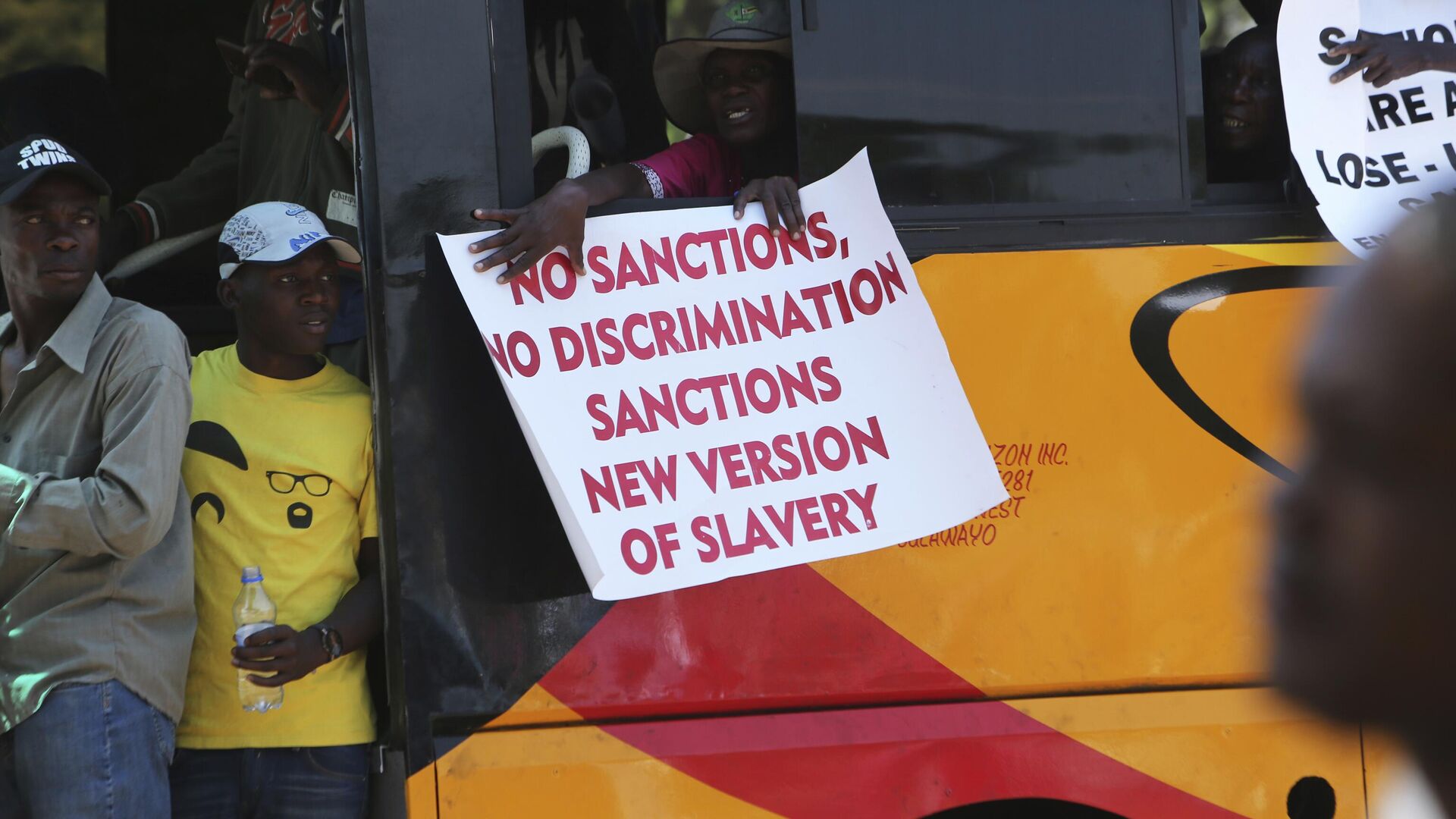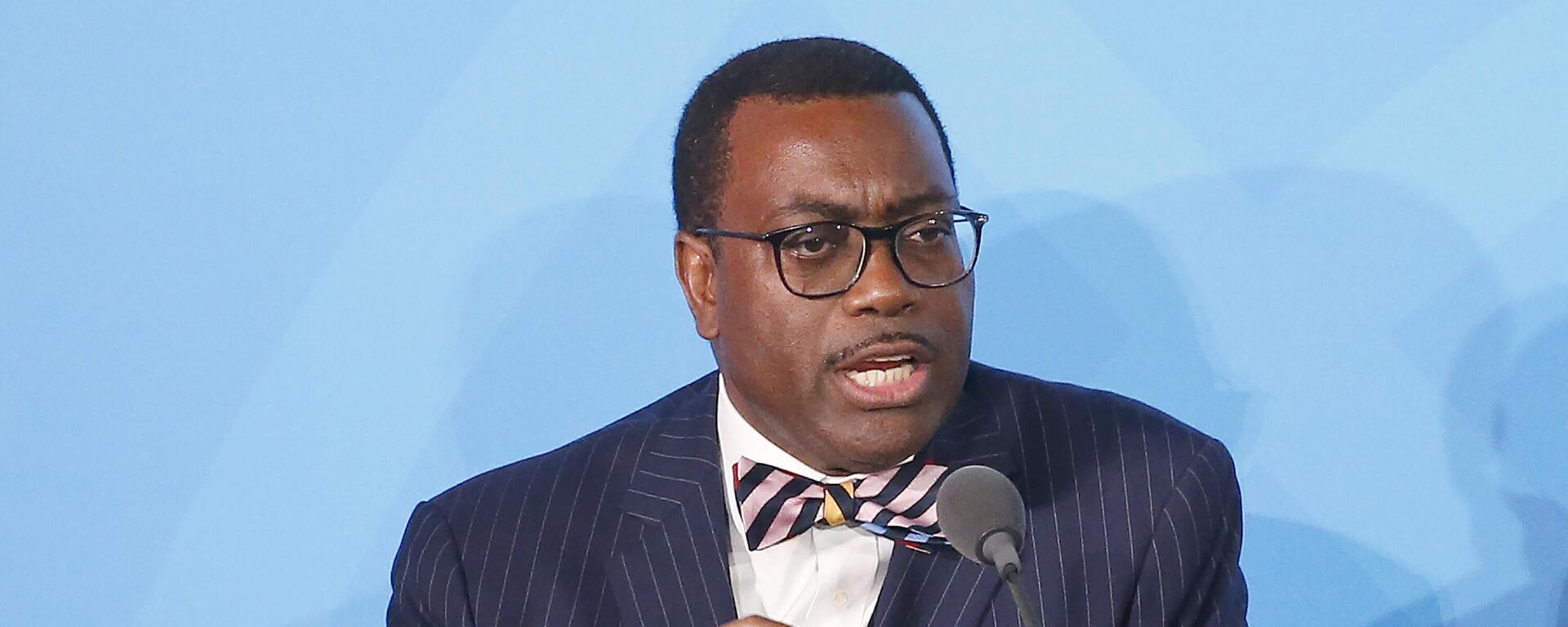https://en.sputniknews.africa/20230608/defending-our-country-zimbabwean-civil-rights-group-petitions-us-over-sanctions-1059786648.html
'Defending Our Country': Zimbabwean Civil Rights Group Petitions US Over Sanctions
'Defending Our Country': Zimbabwean Civil Rights Group Petitions US Over Sanctions
Sputnik Africa
Zimbabweans have repeatedly called for the unconditional removal of economic sanctions imposed by Western states on the nation at the beginning of the 21st... 08.06.2023, Sputnik Africa
2023-06-08T12:16+0200
2023-06-08T12:16+0200
2023-08-03T10:44+0200
sub-saharan africa
southern africa
zimbabwe
sanctions
united nations (un)
economic growth
crisis
economy
https://cdn1.img.sputniknews.africa/img/07e7/05/1f/1059608179_0:160:3072:1888_1920x0_80_0_0_2d1e5c492a5d962e31ebf9f3dcdb02ad.jpg
Zimbabwean anti-sanctions group Citizens Against Economic Sanctions (CAES) has launched a petition against the US, the UK and the United Nations, demanding the removal of sanctions imposed on the nation, local media has reported. Executive director of the group Martin Zharare told media that even though the US insists the sanctions are aimed at a few individuals, those who suffer the most are ordinary citizens. He explained that CAES is an advocacy group founded by Zimbabweans who are willing to speak out against unjustified sanctions. According to Zharare, the organization has already launched various programs to make ordinary Zimbabweans heard. In particular, he pointed at the petition that received more than 5,000 signatures. He recalled that the US, Britain and their allies were the ones who imposed sanctions on Zimbabwe. They "are sponsoring" these measures on the political field as a way to disrupt economic development and undermine the peace and stability of the country, he said.He explained that the sanctions have been imposed on Zimbabwe in a bid to unseat the present government. Zharare emphasized that these measures can't be seen as fair or lawful, noting that Zimbabweans are ready "to defend our country".The CAES executive director also noted that as Zimbabwe is set to hold general elections, it would be "unfair" of the Western states to maintain the sanctions, and continue to exert pressure on ordinary people who want to live in a prosperous and dynamically developing nation. The country will hold its next general election on 23 August. Besides choosing the president, Zimbabwe's voters will also cast ballots for 80 senators and 270 members of the National Assembly, as well as about 2,000 local council positions.Since the 2000s, the southern African country has been subject to economic sanctions by the US and its allies over alleged human rights abuses, the purported "continued intimidation of political opponents and harassment of the independent press". The capital, Harare, vehemently denies the allegations and has called for the lifting of sanctions.According to the president of the African Development Bank (AfDB) Akinwumi Adesina, economic sanctions imposed on Zimbabwe substantially limit its access to credit and thus drive the nation "further into unsustainable debt". As well as limited access to credit, the country is experiencing other economic hardships largely associated with the sanctions, including hyperinflation, high unemployment and a shortage of basic goods.
https://en.sputniknews.africa/20230516/zimbabwe-sanctions-contribute-to-unsustainable-debt-increase-afdb-president-says-1059293924.html
southern africa
zimbabwe
Sputnik Africa
feedback@sputniknews.com
+74956456601
MIA „Rossiya Segodnya“
2023
News
en_EN
Sputnik Africa
feedback@sputniknews.com
+74956456601
MIA „Rossiya Segodnya“
Sputnik Africa
feedback@sputniknews.com
+74956456601
MIA „Rossiya Segodnya“
southern africa, zimbabwe, sanctions, united nations (un), economic growth, crisis, economy
southern africa, zimbabwe, sanctions, united nations (un), economic growth, crisis, economy
'Defending Our Country': Zimbabwean Civil Rights Group Petitions US Over Sanctions
12:16 08.06.2023 (Updated: 10:44 03.08.2023) Zimbabweans have repeatedly called for the unconditional removal of economic sanctions imposed by Western states on the nation at the beginning of the 21st century. Most of the citizens claim that the sanctions not only hinder the country's economic development but also affect the everyday lives of ordinary people.
Zimbabwean anti-sanctions group Citizens Against Economic Sanctions (CAES) has launched a petition against the US, the UK and the United Nations, demanding the removal of sanctions imposed on the nation, local media has reported.
Executive director of the group Martin Zharare told media that even though
the US insists the sanctions are aimed at a few individuals, those who suffer the most are ordinary citizens.
He explained that CAES is an advocacy group founded by Zimbabweans who are willing to speak out against unjustified sanctions. According to Zharare, the organization has already launched various programs to make ordinary Zimbabweans heard. In particular, he pointed at the petition that received more than 5,000 signatures.
"We have rolled out a lot of programs to speak out against sanctions. We have organized petitions. The first petition was signed by more than 5,000 people. We also have another petition for the American Embassy, British Embassy and the United Nations," Zharare is quoted as saying.
He recalled that the US, Britain and their allies were the ones who imposed sanctions on Zimbabwe. They "are sponsoring" these measures on the political field as a way to disrupt
economic development and undermine the peace and stability of the country, he said.
"Sanctions have destroyed our economy. Sanctions have destroyed livelihoods and industries. Zimbabweans have spoken against the sanctions. We are an advocacy group, a pressure group which is putting pressure on the Americans and the British for imposing sanctions on Zimbabwe," he said.
He explained that the sanctions have been imposed on Zimbabwe in a bid to unseat the present government. Zharare emphasized that these measures can't be seen as fair or lawful, noting that Zimbabweans are ready "to defend our country".
The CAES executive director also noted that as Zimbabwe is set to
hold general elections, it would be "unfair" of the Western states to maintain the sanctions, and continue to exert pressure on ordinary people who want to live in a prosperous and dynamically developing nation.
"It would be unfair to have elections taking pace while people are experiencing hardships because of sanctions," Zharare said.
The country will hold
its next general election on 23 August. Besides choosing the president, Zimbabwe's voters will also cast ballots for 80 senators and 270 members of the National Assembly, as well as about 2,000 local council positions.
Since the 2000s, the southern African country has been subject to economic sanctions by the US and its allies over alleged human rights abuses, the purported "continued intimidation of political opponents and harassment of the independent press". The capital, Harare, vehemently denies the allegations and has called for the lifting of sanctions.
According to the president of the African Development Bank (AfDB) Akinwumi Adesina, economic sanctions imposed on Zimbabwe substantially limit its access to credit and thus drive the nation "further into unsustainable debt". As well as limited access to credit, the country is experiencing other
economic hardships largely associated with the sanctions, including hyperinflation, high unemployment and a shortage of basic
goods.


